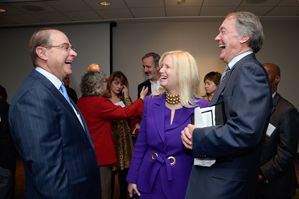From the science museum to congress


President Aoun shares a laugh with Representative Markey and his wife, Susan Blumenthal, after the ceremony. Photo by Kristie Gillooly.
Just about every kid within a 50-mile radius of Boston’s Museum of Science visits that place at some point in his or her early education or scouting career. If they’re lucky, they might even get to do an overnight, sleeping under the life-size dinosaur model on the first floor.
I remember my visit well and so does U.S. Congressman Ed Markey. Having grown up in Malden, Mass., Rep. Markey hopped a bus at age 10 with his fellow cub scouts in Den 9 of the Immaculate Conception Grammar School to make the trip. “When we went back to the Immaculate Conception Grammar School,” Markey recalls, “the nuns taught us that there was no tension between science and religion. But in fact, science was an answer to our prayers because it made it possible to improve the lives of people in ways that had never happened before.”
On Monday, the presidents of Northeastern University, Boston University, Harvard University and the Massachusetts Institute of Technology — all members of the Science Coalition — gathered at the museum to present Markey with the Champion of Science award. The award recognizes his advocacy for funding basic research in science and technology throughout his 36 years in office.
In opening remarks, Northeastern President Joseph E. Aoun noted that Markey’s mission is more relevant today than ever before. “We need champions and you are our champion,” said Aoun.
After 25 years of serving on the Telecommunications Committee, Markey joined the Energy and Commerce Committee, which is now tasked with addressing some of the most pressing challenges facing our planet.

The presidents of Northeastern, BU, Harvard and MIT, along with the president of the Boston Museum of Science, presented Representative Ed Markey with the Science Coalition’s Champion of Science Award on Monday. Photo by Kristie Gillooly.
Markey recalled that in the 1960s, President John F. Kennedy “challenged America to be bold” when he addressed the United States Congress. Putting a man on the moon before the end of the decade, Kennedy said, would require developments in engineering, metallurgy and science. But it was done. Every day, Markey said, the flag that eventually flew on the moon looks out over Congress. “It’s an incredible example of how that generation understood the importance of what you do,” he said, acknowledging universities.
“Each generation has to answer the question: do they understand the future?” Markey said. “Do they understand that you don’t get a return on the incredible human capital your country has unless you make the investment?”
Regardless of the outcome of Tuesday’s presidential election, the basic sciences stand to lose significant funding on Jan. 2 if Congress does not reduce the federal budget by about $110 billion before then. The National Institutes of Health and the National Science Foundation are among the “discretionary programs” that could collectively lose $39 billion, resulting in an estimated 8.2 percent loss per program per year.
“That is the greatest tragedy that could befall our country,” said Markey. “We are only 4 percent of the world’s population, but we are still the hope of the world.”
Going forward, he said, we must all be more persistent in urging our representatives to act with foresight and bipartisanship. “This tension between religion and science that Sister Creda told us was nonexistant is wide as the Mississippi River,” he said. “To overcome it, we need to partner across the aisle and challenge Congress with the same boldness that put a man on the moon.”





